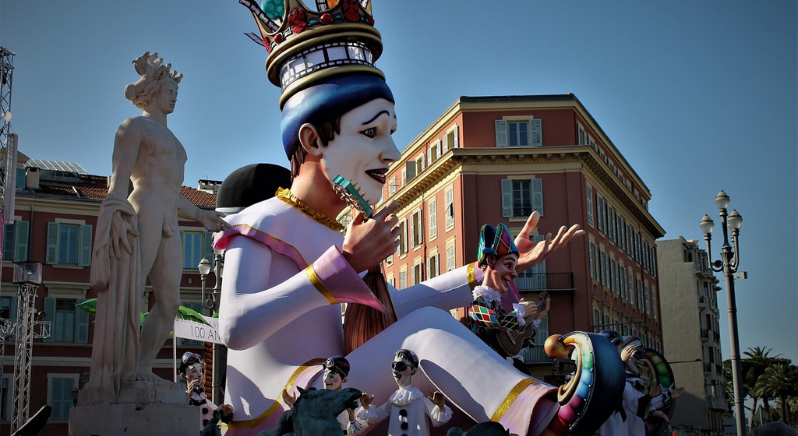The Carnival of Nice, celebrated annually, is a vibrant festival held over approximately 15 days in February or March.
The carnival is renowned for its extravagant parades and thematic events that draw thousands of visitors to the French Riviera each year.
Historical roots
The Carnival of Nice, dating back to 1294, began as a local celebration of feasting, music, and dancing before Lent (in the Christian Church, it is the period preceding Easter, which is devoted to fasting, abstinence and penitence). In the 19th century, it became more structured, with significant events like royal visits, and by 1830, it had become a major civic tradition.
Today, the Carnival of Nice is celebrated every February and lasts for two weeks, drawing thousands of visitors to its vibrant parades filled with dancers, floats, and music. Each year, a specific theme is chosen, enhancing the creativity and spectacle of the event.

Carnival parades
The highlight of the carnival is the series of parades, including the Carnaval Parade of Lights and the Flower Parade, which take place in the iconic locations of Place Masséna and the Promenade des Anglais.
The Carnaval Parade of Lights is a dazzling nighttime event featuring massive, illuminated floats, intricate animated sculptures, and lively performers, creating a magical atmosphere as the city lights up.
Meanwhile, the Flower Parade is a vibrant daytime procession where elaborately decorated floats, adorned with locally grown flowers, fill the streets. During the parade, spectators are treated to showers of colorful blossoms, adding a fragrant touch to the celebration.
Carnival traditions
“Berner Lou Paillassou” is one of the most distinctive traditions of the Carnival, symbolizing the release of worries from the past year by tossing a puppet into the air using a bedsheet. This tradition has included notable figures like Donald Trump and Gérard Depardieu as puppets, adding a contemporary twist to the festivities.
Another significant aspect is the ceremonial burning of the Carnival King. One of the central figures of the carnival, the “King” embodies the theme of each year’s celebration. The burning of the Carnival King, accompanied by a fireworks display, marks the end of the festivities and the conclusion of the carnival season.
Themed activities and workshops
Each year, a specific theme is chosen, enhancing the creativity and spectacle of the event. Special themed activities and workshops take place at different centers across the city, offering free admission and engaging activities for participants.
Food and drinks
Food and drinks play an essential role in the Nice Carnival. Local delicacies and traditional dishes are enjoyed throughout the festivities. The wide variety of options available reflects the region’s flavors, enhancing the overall carnival experience.
Here are some must-try dishes:
- Socca: A savory chickpea flour pancake, crispy on the outside and soft on the inside, often enjoyed as a street food snack.
- Pan bagnat: A classic Niçoise sandwich made with fresh ingredients like tuna, olives, anchovies, tomatoes, hard-boiled eggs, and lettuce, all drizzled with olive oil and packed into a round baguette.
- Salade niçoise: A vibrant salad made with tuna, green beans, potatoes, eggs, olives, and tomatoes, dressed with olive oil and a bit of vinegar or lemon.
- Pissaladière: A type of savory tart topped with caramelized onions, olives, anchovies, and a drizzle of olive oil, a staple in Niçoise cuisine.

Useful information
To find useful information about the Nice Carnival, including event details, schedules, and updates, it’s best to check the official Carnival website or follow their social media channels. These platforms provide up-to-date information on dates, locations, and any special events happening throughout the festival.
For more insights into French culture and events, be sure to visit our blog!





